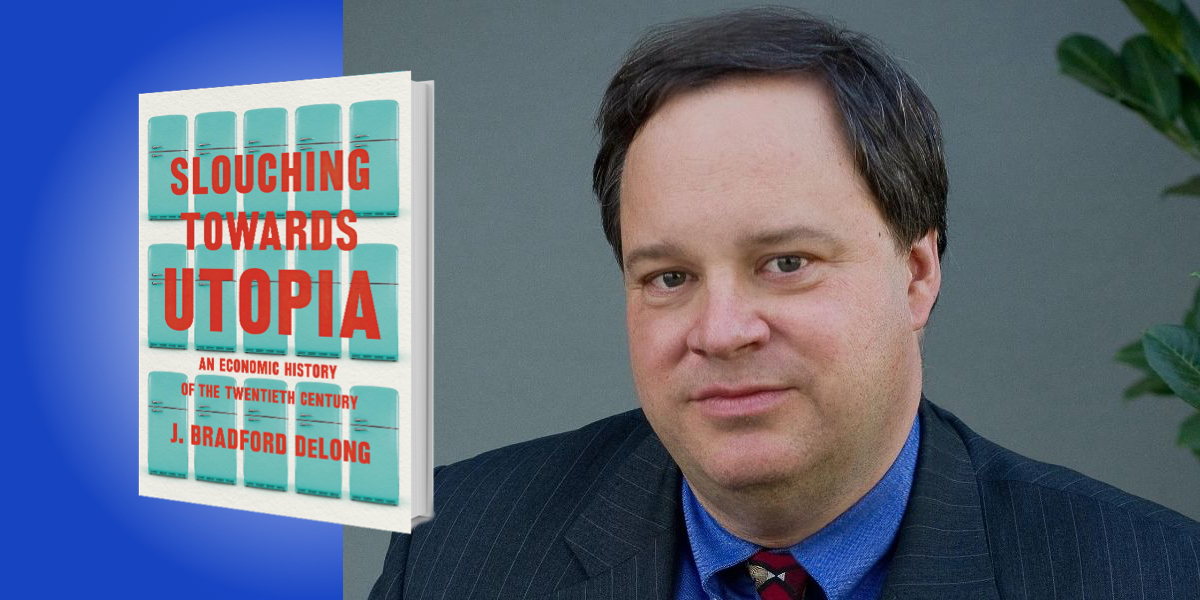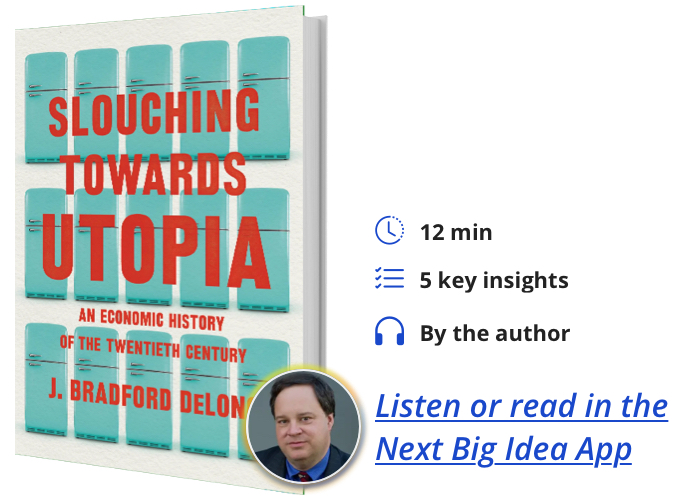J. Bradford DeLong is an economic historian and economic professor at the University of California, Berkeley. He served as deputy assistant secretary of the U.S. Treasury during the Clinton administration.
Below, Brad shares 5 key insights from his new book, Slouching Towards Utopia: An Economic History of the Twentieth Century. Listen to the audio version—read by Brad himself—in the Next Big Idea App.
1. Start with the metaphor of the economic pie.
Start with the metaphor of the “economic pie.” First, you have to bake a big-enough pie. The pie is sliced so everyone has enough. Then, people have to enjoy their slice by using their wealth to live lives in which they are healthy, safe, secure, and happy.
Before 1870, we humans simply could not bake a big-enough pie. By 2010, we could. That solved the problem of baking. That ought to have solved the big problem of building a utopia, according to the thinking of those living in earlier ages. The problems of tasting and slicing, with enough pie, should have thus been easier to deal with.
Most non-utopian features of past human societies were a consequence of there not being enough for everyone. To have enough for oneself meant figuring out a way to dominate others and appropriate their work. Gaining wealth meant using the following: force and fraud; exploitation and domination. One needed to do one of those in order to have enough. Now we do have these things. Yet we are still manifestly not in utopia.
2. We solved the problem of baking the pie.
Back in the Industrial Revolution, the proportional rate of growth of “technology” deployed and diffused into the world economy was 0.45 percent yearly worldwide. That is slow enough that a population growth rate of 0.9 percent per year would neutralize any impact of better technology on average incomes. A poor world population could easily grow at 0.9 percent per year—doubling every three generations—keeping humanity at a stagnant level. At this rate, the population would never get rich enough to trigger the fertility decline and a demographic transition.
A big shift occurred around 1870: the coming of the industrial research lab, the modern corporation, and full globalization. The average rate of technology deployed and diffused worldwide rapidly jumped from 0.45 percent per year to 2.1 percent per year, where it stayed at least until 2010. The doubling time of technology went from 160 years to 34 years. Malthusian population growth could not keep up. The world became rich enough for a demographic transition to take hold.
“Previously unimaginable economic growth revolutionized human life and did so repeatedly from then on.”
After 1870, the problem of baking a big enough pie was on track to being solved. Its solution was straightforward: Just let the market economy rip. Let the industrial research labs and the corporations do their thing in the context of the world market economy, produced by full globalization. Previously unimaginable economic growth revolutionized human life and did so repeatedly from then on.
How should we answer our predecessors who would look at the extraordinary and amazing technological power of our civilization and ask, “Why have you not created a utopia, since you have solved the problem of enough?”
3. A free-market economy didn’t solve its own problems.
So, what happened? First off, letting the market economy rip had consequences. The repeated, sequential, Schumpeterian creative-destruction economic revolutions meant that all that was solid melted into air. All previously established patterns and orders were steamed away. While humanity was not compelled to face the real life conditions or relate with one another, they did have to try to build new institutions to manage the problems and opportunities brought on by the production, distribution, and utilization of new technologies.
Friedrich von Hayek thought the unleashed market would do the whole job and the market would produce enough. While he conceded that it could not produce “social justice,” he argued that we should not ask for social justice. In his view, attempting to achieve social justice would undermine the market economy’s ability to do what it could do, and put us on the road to serfdom. “The market giveth, the market taketh away: blessed be the name of the market” had to be our only gospel.
4. People demanded more than just property rights.
However, as Karl Polanyi put it in his book The Great Transformation, the “stark utopia” of von Hayek’s catallaxy [economy] was unsustainable. People would not stand for being told that there are no rights but property rights. They instead insisted that “the market was made for man, not man for the market.” Markets treated those whom society saw as equals unequally, therefore bringing social explosion after explosion, blocking the road to utopia.
“[People] insisted that ‘the market was made for man, not man for the market.'”
People saw themselves as deserving communities, incomes, and stability. They needed their Polanyian rights—to economic security, to an income level proportional to what they deserved, and what they viewed as income levels proportional to what others deserved. They demanded a connected society that gave them respect and a place. Ideally, that economy should also grant some power in society to those with no wealth. Trying to bring about the stark utopia of market society would thus face opposition, eventually being overwhelmed by social-political movements that sought social justice.
5. Past leaders failed to find a solution for everyone to slice and enjoy the pie.
Though we solved the problem of baking the pie, we fumbled the solution to the problems of slicing and tasting it. Since 1870, people like Theodore Roosevelt, John Maynard Keynes, Benito Mussolini, Franklin Delano Roosevelt, Vladimir Lenin, Margaret Thatcher, Deng Xiaoping, and others tried to think up solutions. They dissented from “the market giveth” both constructively and destructively. They demanded that the market do less, or differently, and that other institutions do more. Keynes whimpered that if only governments allowed his technocratic students to conduct a sensible monetary policy, along with a comprehensive socialization of investment, everyone could attain a job and social power. His idea suggested that technology plus compound interest would wreak marvels and rock-bottom interest rates would “euthanize” the rentiers. Plutocrats could then use their social power only at the cost of spending down their capital, therefore relinquishing it. Keynesian technocrats could then solve the problems of production and distribution, leaving humanity to grapple with its real problem: the utilization of our wealth to create a truly human world.
Perhaps humanity did indeed come close to an institutional-societal set up to tackle the problems of slicing and tasting. The New Deal Order, post-WWII “social democracy” in the rich countries was a good try. Social democracy failed its sustainability test, however, and was replaced by neoliberalism, which stubbornly persists in spite of its failure to fulfill any of its promises except to make the rich richer with more social power. Society may not know what “social justice” is yet, but it knows that our current society does not consist of giving benefits to and making life easy for those it assesses as “undeserving.”
“In the rich countries, there is enough, by any reasonable standard, and yet we are all unhappy.”
So, the wheel turns and here we are. Why aren’t the people of the global north happier and more satisfied with the techno-utopian marvels that have been delivered to them? Why has great wealth in historical perspective not reduced but increased economic anxiety? How does that economic anxiety get transformed into ethno-nationalist fear and rage? How is it that the neoliberal ordering of society still survives, given that it has fulfilled exactly none of the promises made by its original salesmen. How does it continue to make the rich richer and society more economically unequal? In the rich countries, there is enough, by any reasonable standard, and yet we are all unhappy. We all earnestly seek to discover who the enemies are, who have somehow stolen our rich birthright and fed us unappetizing lentil stew instead.
What do we do next? That is for a younger generation than mine to decide. This generation faces problems like global warming, ethno-national terrorism on all scales, revived fascism, and technokleptocracy, among others. As John Maynard Keynes wrote back in 1924, knowing what to do next “assumes a plan exists. But we lack more than usual a coherent scheme of progress, a tangible ideal. All the political parties alike have their origins in past ideas and not in new ideas…. No one has a gospel. The next move is with the head…”
To listen to the audio version read by author J. Bradford DeLong, download the Next Big Idea App today:
































